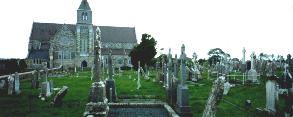THE PARISH of
EMLY - ITS HISTORY
The
full name of Emly in the Irish language is 'Imleach Iubhair' which
literally means 'The Border of the Lake of the Yew Trees.' The yew
tree reminds us of the pre-Christian history of Emly.
Emly is one of the oldest centres of Christianity in Ireland.
We boast that it pre-dates our National Apostle, St. Patrick.
Up until the early Middle Ages Emly was the seat of the premier
diocese in the south of Ireland.
St. Ailbe is Patron Saint of the Archdiocese of Cashel and Emly.
Tradition tells us that he preached Christianity in Munster before
the arrival of St. Patrick. He is also associated with the
founding of a monastery at Emly. In their book 'The Parish
of Emly' Michael and Liam O'Dwyer write, "Despite the complete obliteration
of the layout of the original site we may presume that the monastic
enclosure coincided with the present graveyard. The presence of
a well and an inscribed cross, both tradition ally associated with
St. Ailbe, and the fact that successive cathedrals occupied the
area near the middle of the graveyard, are sufficient evidence for
this assumption."
Emly remained a Cathedral city until the 16th century.

Click Image to Enlarge
Blessed
Dermot O'Hurley was born at Emly about the year 1530. He spent
much of his time working in Rome in the service of the Church.
He was still a layman when in 1581, he was appointed Archbishop
of Cashel. In 1583, O'Hurley arrived in a troubled Ireland. He never
reached his diocese but was arrested, imprisoned and tried for treason.
He was tortured and then executed.
Blessed Terence Albert O'Brien was the last bishop of the diocese
of Emly. He was captured by the Cromwellian troops after the
siege of Limerick and with other leaders was put to death.
In 1992 the Pope beatified Dermot O'Hurley and Terence Albert O'Brien
in Rome.
Canon Maurice Power became Parish Priest of Emly in 1886.
He found the fabric of the parish to be very 'run down.' He
set about restoring some of the glory of Emly. In 1882 he
completed the building of our Gothic church. It is a limestone structure
with a be autiful fašade and many fine stained glass windows.